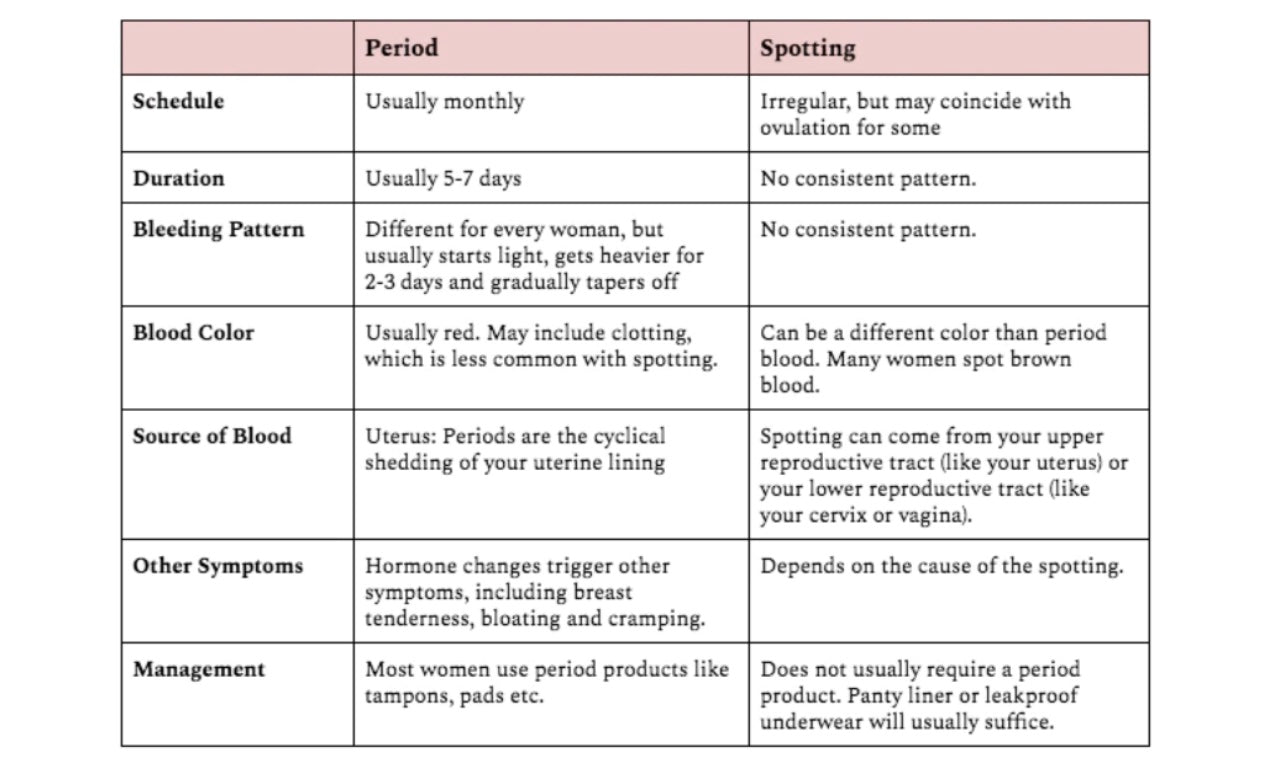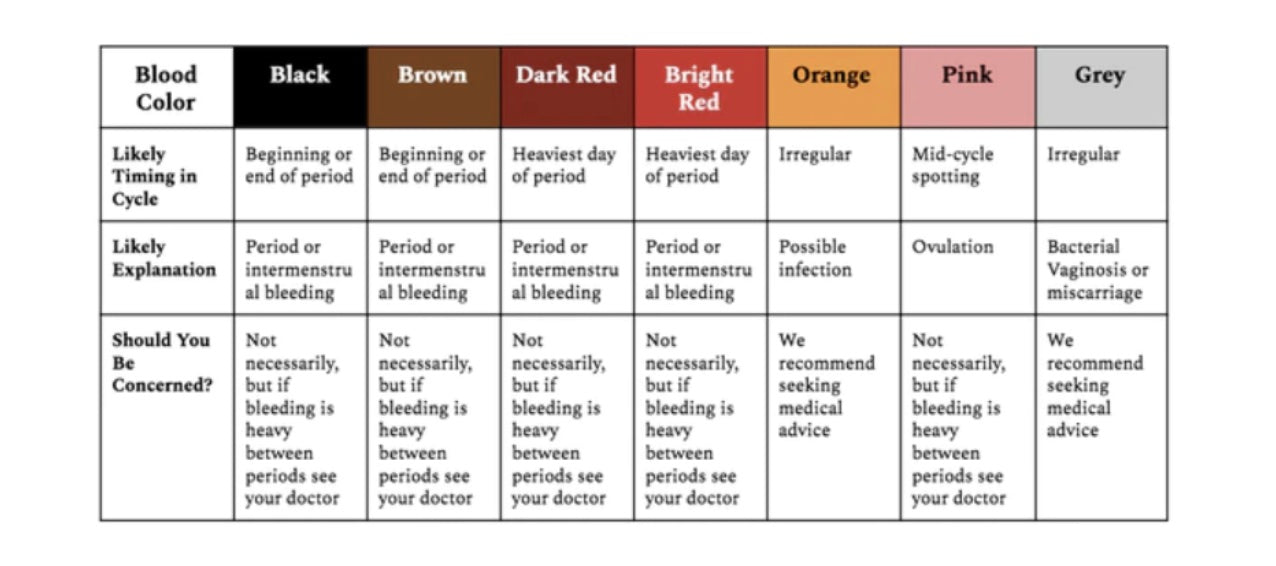Understanding Blood Spotting: Why You Might Be Spotting a Week After Your Period
This article was medically reviewed by Dr. Navya Mysore and updated on March 8, 2024
If you experience spotting after your period, know you’re not alone. Many women experience bleeding or spotting between periods and there are many possible explanations.
Relax: Many of these explanations are perfectly normal and not necessarily medically concerning. While it’s likely jarring that this is happening to you, it’s worth understanding and tracking what is happening to your body.
What Is Spotting?
In general, spotting is any kind of light bleeding that is not having a period (e.g., breakthrough bleeding). We’ll go through some of the different characteristics of menstrual bleeding versus spotting.
How to Tell the Difference Between Spotting and Menstrual Bleeding
Here’s an overview to help you tell the difference:

Spotting Is Any Light Bleeding
Spotting is any light bleeding between periods. There can be many causes of spotting between periods, some totally safe and some that are concerning. As such, spotting doesn’t usually follow any pattern.
While unexplained spotting can be irregular, spotting that is caused by events in the menstrual cycle, like ovulation, may occur regularly.
Spotting blood can have a different hue than period blood. It might be brown and it can also have a different texture or appear more like vaginal discharge.
Most Spotting Is Light
Finally, most spotting is light: A panty liner or period underwear is usually sufficient to handle the bleeding caused by spotting.
If you experience heavy bleeding outside a period that requires more than a panty liner or experience consistent irregular spotting in between periods, you should consult a medical professional.
Irregular Bleeding a Week After Your Period: Possible Causes
The truth is there are many possible explanations of bleeding between periods. Some of these, you’ll be able to rule out on your own (e.g., if you’re not on medication or know you're not pregnant). But when in doubt, check in with your doctor to review your symptoms.
This list is not exhaustive, but these are the most common causes of bleeding between periods.
Birth Control Causes

- Birth control pills: According to Medical News Today, bleeding between periods often occurs in the first 6 months of taking new birth control pills (or other hormonal contraceptives). Doctors sometimes refer to this birth control-related spotting as breakthrough bleeding.
- Morning-after pill: According to the Mayo Clinic, the morning-after pill (a.k.a. emergency birth control) can cause bleeding between periods or heavier menstrual bleeding.
- Intrauterine device (IUD): Some women with an IUD for birth control may also experience irregular menstrual bleeding patterns.
External Causes of Vaginal and Uterus Bleeding
- Trauma or medical examination: If you’ve experienced rough sex or a medical exam like a Pap test, you may also experience vaginal bleeding outside of your menstrual period.
- Medications: Certain medications (besides the birth control pill and hormonal contraceptives) may cause abnormal vaginal bleeding or irregular menstrual periods. Your pharmacist should advise you of any side effects of medication.
- Stress: Increased stress may trigger many reactions. Stress may cause all kinds of changes in your body, including irregularities in your menstrual cycle. Sometimes, bleeding occurs due to high levels of emotional stress.
Common Infections
The following infections may cause irregular bleeding between periods. It’s worth noting that most infections are treatable. However, infections can become more serious if symptoms like different vaginal discharge, pelvic pain, or urinary symptoms go untreated.
- Sexually transmitted infection (STI), including chlamydia, gonorrhea, and genital warts
- Pelvic inflammatory disease (PID), an infection of the upper part of the female reproductive system that often arises due to an STI that has gone untreated.
Pregnancy-Related Causes
- Ovulation: When the ovaries release the oocyte (immature egg), a tiny follicle ruptures to allow it to be released. This can be a cause of spotting or light bleeding for a day or so.
- Implantation bleeding: After a sperm fertilizes an egg, the fertilized egg implants in the womb. Sometimes, implantation causes light bleeding known as implantation bleeding. Implantation bleeding is not usually something to worry about as it’s light, stops on its own, and doesn’t require treatment.
- Ectopic pregnancy: In an ectopic pregnancy, the fertilized egg implants in a location outside the uterus, usually in the fallopian tube. Signs and symptoms of an ectopic pregnancy include abdominal pain and vaginal bleeding, and require prompt medical attention, according to the Mayo Clinic.
- Pregnancy: According to the American Pregnancy Association, 20% of women experience spotting during the first 12 weeks of being pregnant.
- Miscarriage: Sometimes with a miscarriage you may not have heavy bleeding but can have spotting and cessation of other pregnancy symptoms.
- Breastfeeding: Depending on the frequency of breastfeeding and your own individual hormone levels, spotting may occur before full periods return.
Other Causes of Abnormal Uterine Bleeding
- Uterine fibroids or polyps: Symptoms of these benign tumors can include irregular or heavy periods and vaginal bleeding between periods.
- Endometriosis: According to the Mayo Clinic, women with endometriosis may experience heavy menstrual periods or irregular bleeding between periods (intermenstrual bleeding).
- Polycystic ovary syndrome (PCOS): Polycystic ovary syndrome can cause cysts in the ovaries and affect fertility. It can also cause irregular vaginal bleeding.
- Blood clotting disorders, like von Willebrand disease, can cause abnormal uterine bleeding.
- Other health conditions, like hypothyroidism, liver disease, or chronic kidney disease could cause irregular vaginal bleeding.
- Cancer or precancer: Cervical cancer and uterine cancer can cause spotting or abnormal bleeding.
Perimenopause & Menopause
- Perimenopause: The time before menopause is known as perimenopause. During perimenopause, hormone levels fluctuate greatly. These hormonal shifts can have an effect on ovulation and your entire menstrual cycle. Some notice irregular or skipped periods, heavy or light periods, and abnormal bleeding between periods during perimenopause.
- Vaginal dryness: Dryness, especially due to lack of estrogen after menopause, can cause bleeding.
The Significance of Blood Color
Many report spotting different color blood or discharge than their usual period. For example, some may report brown discharge or brown period blood.
A Range During Your Menstrual Cycle Is Normal
It is not unusual to experience a range of color, from pinkish and bright red to brown blood, in period blood and spotting. Brownish discharge and spotting isn’t necessarily something to be immediately concerned about.
Pay Attention to Color and Symptoms
However, do pay attention to color and any accompanying symptoms. Below is a breakdown of what blood color might signify:

When to Seek Medical Advice for Vaginal Bleeding
Many of us avoid consulting medical professionals about menstrual or intermenstrual concerns. However, if your bleeding pattern continues for a few cycles, talk to your health care provider.
If there’s nothing to worry about, they’ll be able to set your mind at ease. However, there are times when spotting or bleeding between periods could be a cause for concern. And if that’s the case, the sooner you see a doctor, the better.
Watch for These Symptoms
If spotting is accompanied by any of the following symptoms, it warrants getting some medical advice.
- Heavy bleeding during your period with a lot of clotting
- Irregular periods
- Abdominal pain or cramping
- Pain or a burning sensation when urinating
- Unusual vaginal discharge and/or redness and itchiness
Don’t Ignore Spotting in These Situations
Even if you don’t have any of the other symptoms mentioned above, don’t ever ignore spotting, abnormal vaginal bleeding, or abnormal uterine bleeding. If it's happening consistently or inconsistently on a frequent basis, it’s worth bringing it up to your healthcare provider—especially in the following scenarios.
- If you think you’re pregnant: You should see a doctor as soon as you think you may be pregnant to confirm you’re pregnant
- When it happens inconsistently: If spotting seems to happen frequently and randomly, you should definitely talk to your healthcare provider
- It begins after unprotected sex: Unprotected sex can put you at risk for sexually transmitted infections (STIs) and other infections, so if you notice spotting after unprotected sex, it’s wise to seek medical advice
- You are on medication: Spotting or breakthrough bleeding can be a side effect of any medication you are on, so it’s happening consistently you should ask your healthcare provider
- Spotting occurs postmenopause: It is never considered normal for anybody postmenopause to experience spotting or vaginal bleeding
Track Your Cycle
We recommend tracking your entire menstrual cycle with a journal or app. In addition to noting your period days, keep track of the following throughout your entire cycle:
- Spotting between your period
- Heaviness of bleeding
- Blood color
- Abdominal pain or cramping
- Breast tenderness
- Mood changes
- Vaginal discharge
Get to Know Your Cycle
Getting to know your own individual cycle and flow will help you better understand your body and identify when something might be concerning or unusual. This will also equip you to discuss any concerns with a medical professional.
However, if you’re experiencing pain or heavy bleeding, don’t wait. Go see your healthcare provider and let them investigate further. Hopefully, it turns out to be nothing major. Either way, you’ll be glad you didn’t wait to seek help.
Sources:
https://www.medicalnewstoday.com/articles/322840#causes
https://www.mayoclinic.org/tests-procedures/morning-after-pill/about/pac-20394730
https://americanpregnancy.org/healthy-pregnancy/pregnancy-concerns/spotting-during-pregnancy/
https://www.mayoclinic.org/diseases-conditions/endometriosis/symptoms-causes/syc-20354656
https://www.mayoclinic.org/diseases-conditions/von-willebrand-disease/symptoms-causes/syc-20354978
—
We hope you found this post informative—but remember: we’re not doctors and this post is not medical advice! While all posts are fact-checked and well researched, we always recommend you chat with your doctor about any questions or concerns you might have regarding a medical condition.
We’re here to support and educate, but never with the aim of disregarding professional medical advice you’ve been given. Phew, now that that’s out of the way, you can go on living unapologetically free.











